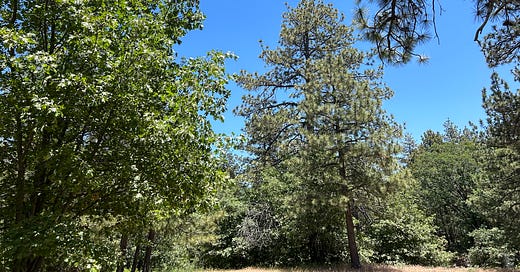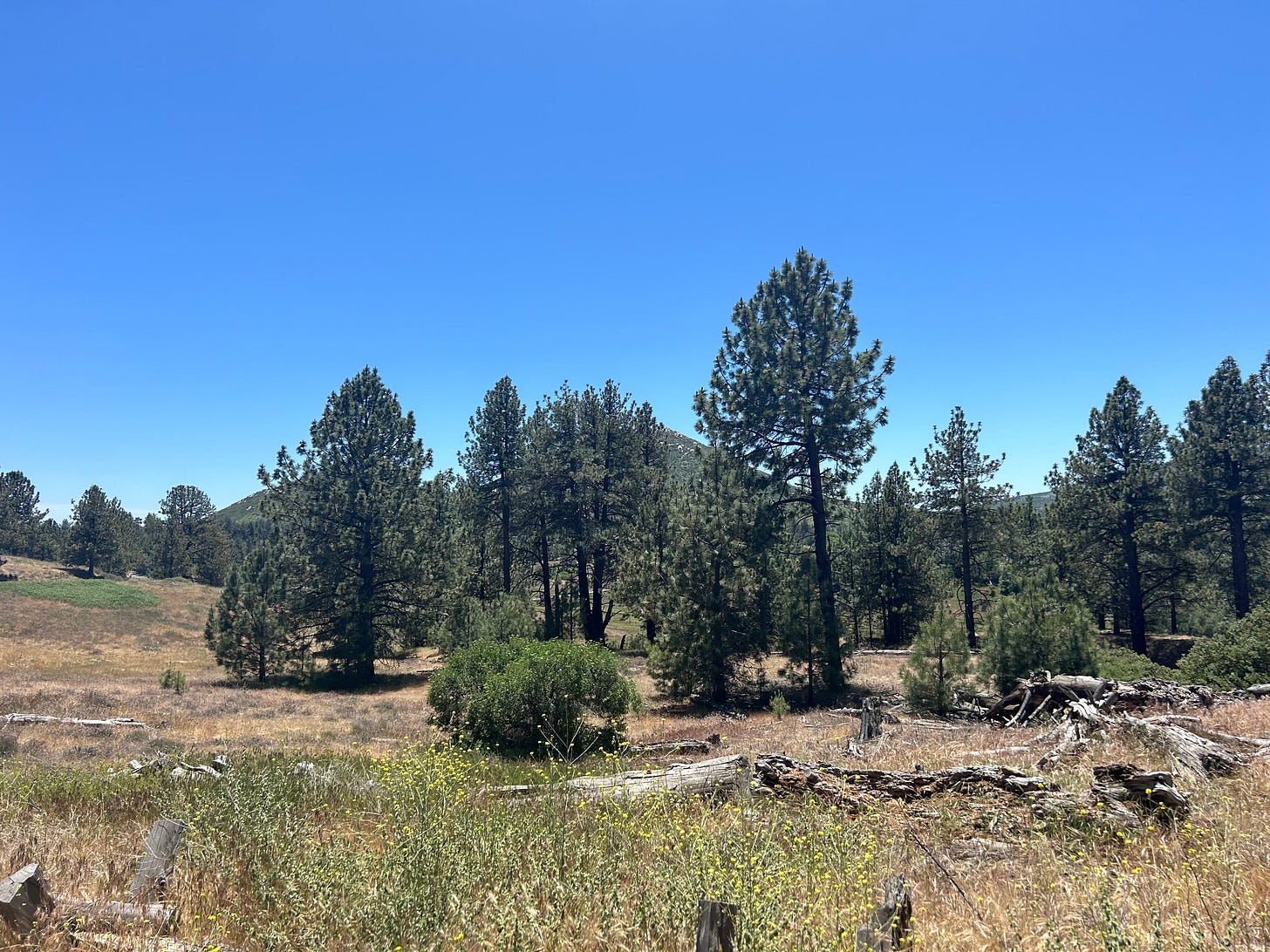I won’t tell you where the road is or whether it’s dirt or paved. Nor will I tell you where to turn to end up by the shady grove of pines where there is nothing but the sound of the wind in the trees and birdsong that rises and falls as you silently sit on a log and gently brush ants off your legs, making sure not to harm them.
It’s hot, but in the shade, the breeze makes it comfortable. You notice the sound of a woodpecker that you can’t see, but he’s over there somewhere, concealed amidst the branches, knocking away. The sky above is pure blue without a cloud in sight, and there is something marvelous about it that you can’t name but revel in, nonetheless.
There is no mechanical noise, save the occasional jet far above, so the sounds of the hillside emerge and comingle with each other—birds, insects, rabbits, deer, and other creatures rustling and resting, chirping, peeping, scurrying, digging, searching for food or shelter.
If I could turn and live with them I would.
Nothing means anything to them in this season of dread. They live, quite wisely, outside of history, politics, and the other all-too-human games and amusements that we enslave ourselves to.
I have no work on this Monday, a deep blessing, but not as deep as the smell of the summer woods. There is nothing to do, no place to go, or anything to purchase that could possibly be more important than taking refuge here in the forest of myself.
What is that sound? That feeling? Can I see anything moving in the tall brush beyond the trees? A wild turkey? A mule deer? Coyote? Mountain Lion?
And what does it mean to take refuge here in the forest of myself? What is that thought? That memory? That glimpse of something on the edge of my imagination? How long till I can stop holding onto thinking and let things simply unfold?
The taste of bread with a sip of water. A bite of green apple, Swiss cheese. Plain, simple, and good.
My mind drifts to Covid dreams in the depth of night in my hot old house in the city—fear, violence, and the humid sheets beneath my sweaty body as I lie awake, my heart pounding after letting go of the image of a loved one dying.
I think about dying, time and time again. I cycle through the death of my beloveds, the demise of nature, the end of the wonderous beauty of the world that is happening right now, all the time, every second of every day. The woeful state of us—nobody is home to answer the bell.
There are so many things we can and should weep for, so many sins for which to atone. The world just keeps making pain.
But then, something destroys me, brings me up.
The sight of a hawk circling and then descending to sit atop a tall pine. It surveys the landscape, takes good measure of it.
Underneath all the pain and misery of the world, love lies trembling, nursing on the salt from our tears. I think of Mary Oliver who wrote, “I don’t say/it’s easy but/what else will do/if the love we claim for the world be true?” So we go on.
Nothing really matters except this.
Note on the Summer Chronicles:
A decade ago, during my time writing for the OB Rag and SD Free Press, I penned a series of pieces over the summer that moved beyond the blog/column form to something a little looser and more open to improvisation and the poetic turn. Last summer, a health crisis intervened, but I made it through to the other side of that and here I am again, writing, word by word, breath by breath.
Below is the original preface for the first series of chronicles:
In the summer of 1967, the great Brazilian writer, Clarice Lispector, began a seven year stint as a writer for Jornal de Brasil [The Brazilian News ] not as a reporter but as a writer of "chronicles," a genre peculiar to Brazil. As Giovanni Pontiero puts it in the preface to Selected Chrônicas, a chronicle, "allows poets and writers to address a wider readership on a vast range of topics and themes. The general tone is one of greater freedom and intimacy than one finds in comparable articles or columns in the European or U.S. Press."
What Lispector left us with is an eccentric collection of "aphorisms, diary entries, reminiscences, travel notes, interviews, serialized stories, essays, loosely defined as chronicles." As a novelist, Pontiero tells us, Lispector was anxious about her relationship with the genre, apprehensive of writing too much and too often, of, as she put it, "contaminating the word." It was a genre alien to her introspective nature and one that challenged her to adapt.
More than forty years later, in Southern California—in San Diego no less—I look to Lispector with sufficient humility and irony from my place on the far margins of literary history with three novels and a few other books largely set in our minor league corner of the universe. Along with this weekly column, it's not much compared to the gravitas of someone like Lispector. So, as Allen Ginsberg once said of Whitman, "I touch your book and feel absurd."
Nonetheless the urge to narrate persists. Along with Lispector, I am cursed with it—for better or worse. So for a few lazy weeks of summer, I will try my hand at the form.





